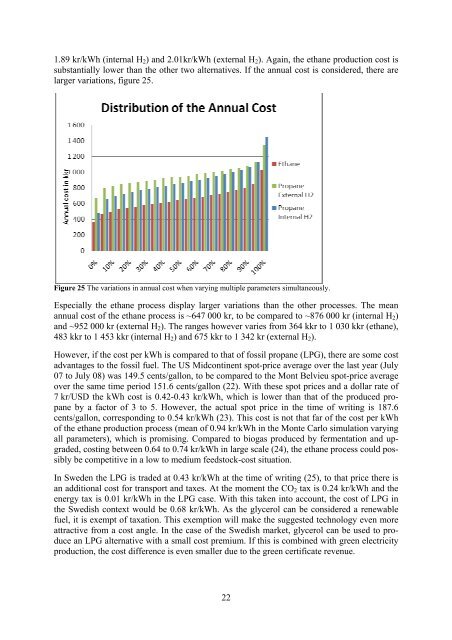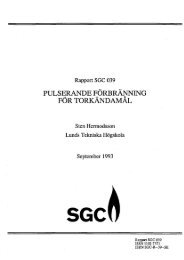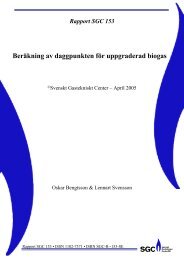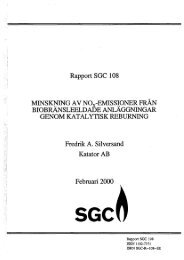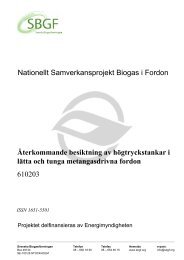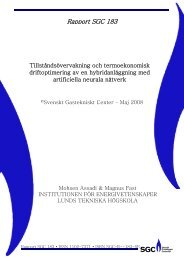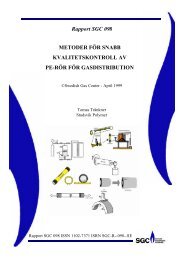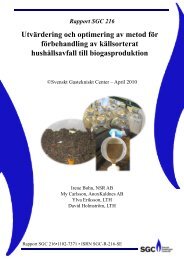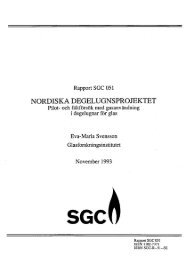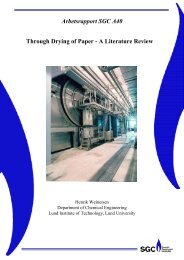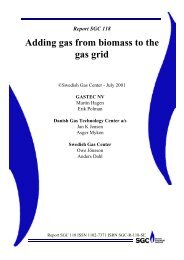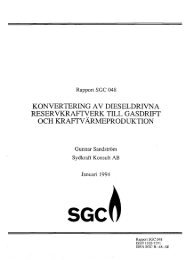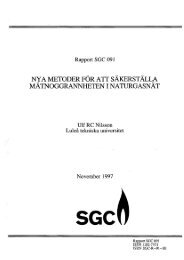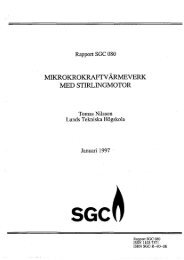Rapport SGC 198 Bio-Propane from glycerol for biogas addition
Rapport SGC 198 Bio-Propane from glycerol for biogas addition
Rapport SGC 198 Bio-Propane from glycerol for biogas addition
- No tags were found...
You also want an ePaper? Increase the reach of your titles
YUMPU automatically turns print PDFs into web optimized ePapers that Google loves.
1.89 kr/ /kWh (internal H 2 ) and2.01kr/kWh (externalH 2 ). Again, the ethane production cost issubstantially lowerthan the other two alternatives. If the annual cost is considered, there arelarger variations, figure 25.Figure 25The variations in annual cost when varying multiple parameters simultaneously.Especially the ethane processs display larger variations than the other processes. The meanannual cost of the ethane process is ~647000 kr, to be compared to ~876 000 kr (internal H 2 )and ~952 000 kr (external H 2 ). The ranges however varies <strong>from</strong>364 kkr to 1 030 kkr (ethane),483 kkrto 1 453 kkr (internal H 2 ) and 675kkr to 1 342 kr (external H 2 ).However, if the cost per kWh is compared to that of fossil propane (LPG), there are some costadvantages to the fossil fuel. The US Midcontinent spot-price average over the last year (July07 to July 08) was 149.5 cents/gallon, to be compared to the Mont Belvieuspot-price averageover thesame timeperiod 151.6 cents/gallon (22). With these spot prices and a dollar rate of7 kr/USD the kWhcost is 0.42-0.43 kr/kWh, whichh is lower than that ofthe produced prois187.6pane bya factor of 3 to 5. However, the actual spot price inthe time of writingcents/gallon, corresponding to0.54 kr/kWh (23). This cost is not that far of the cost per kWhof the ethane production process (mean of 0.94 kr/kWh in the Monte Carlosimulationvaryingall parameters), which is promising. Compared to <strong>biogas</strong> produced by fermentationand up-pos-graded, costing between 0.64 to 0.74 kr/kWh in largescale (24), the ethanee process couldsibly becompetitive in a low to medium feedstock-cost situation.In Sweden the LPGis traded at 0.43 kr/kWh at the time of writing (25), to that pricethere isan <strong>addition</strong>al cost <strong>for</strong> transport and taxes. At the moment the CO 2 tax is 0.24 kr/kWhand theenergy tax is 0.01 kr/kWh in the LPG case. With this taken into account, the cost ofLPG inthe Swedish context would be0.68 kr/kWh. As the<strong>glycerol</strong> can be considered a renewablefuel, it is exempt of taxation. This exemption will make the suggested technology even moreattractive <strong>from</strong> a cost angle. In the case of the Swedish market, <strong>glycerol</strong> can be usedto pro-production, the cost differencee is even smaller due tothe green certificate duce anLPG alternative with a small cost premium.If this is combined with green electricityrevenue.22


